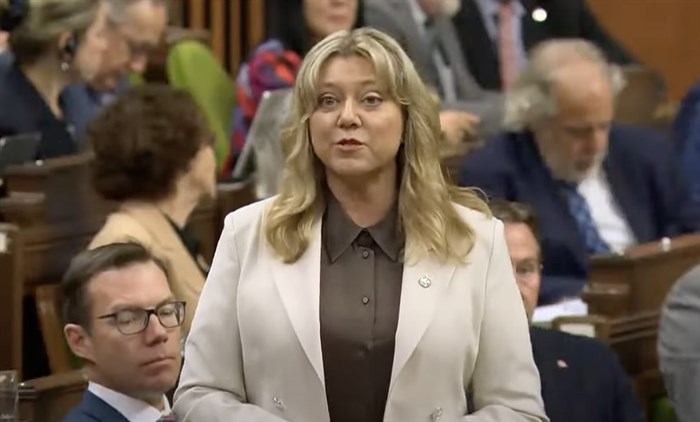House of Commons debate over Kelowna housing data reveals the art of the spin

Housing data for Kelowna sparked an exchange between a local Member of Parliament and the federal Housing Minister in the House of Commons earlier this week where statistics were given out of context.
Kelowna-Lake Country MP Tracy Gray referenced month-to-month housing start data from the Canada Mortgage and Housing Corporation during question period, Nov. 18.
“After nine years the NDP, Liberals are not worth the cost of housing. The failing Liberal housing plan is not building more homes. Housing starts are down last month compared to 2023, 11 per cent in Canada, 30 per cent in B.C. and 87 per cent in Kelowna,” Gray said in the House of Commons.
Minister of Housing Sean Fraser replied with year-to-date data from the CMHC.
“I am very happy to correct the record that my Conservative colleague has put on the floor of the House of Commons. Housing starts are actually up this month eight per cent compared to last month and year over year are trending in a positive direction near the all time record home building pace that Canada has ever seen,” Fraser said in the house.
Last year, we invested $31.5 million to build more housing in Kelowna.
This year housing starts are up 46%.
The local MP wants to cut that essential support from her community because her party leader doesn't like that it came from a Liberal government.
Unbelievable. pic.twitter.com/REtxLeEY7C — Sean Fraser (@SeanFraserMP) November 20, 2024
The CMHC data from the Kelowna metropolitan area comparing October 2023 to October 2024 shows 409 housing starts in 2023, and 52 housing starts last month, which is a decrease of 87 per cent.
However, the year-to-date comparison for the same region shows 2,540 housing starts in 2023, and 3,719 in 2024, which is an increase of 46 per cent.
The manager of economic development for the Regional District of Central Okanagan, Krista Mallory, said individual statistics presented out of context can be used in different ways to tell a different story.
“Interpreting statistics is a science and an art, and we know that the same statistic can be used to tell multiple different stories. So, I would encourage people to go to the source if they can,” she said.
READ MORE: Why building permit values are down dramatically in Kelowna
Mallory said year-to-date statistics show a more accurate picture of housing development than a month-to-month comparison.
“We always look at data from our region on a year-to-date basis. In a region like ours, being the size that we are, we're subject to big data swings, big number swings from month to month. We always look at it over a longer time period and encourage other people to do the same,” she said.
The City of Kelowna’s director of planning Ryan Smith said a month-to-month comparison isn’t helpful when looking at the bigger picture of the housing crisis.
“The one month comparisons are useless in my opinion,” he said.
Gray declined a phone interview, but doubled down on the month-to-month comparison in an emailed statement to iNFOnews.ca.
“Under Trudeau's policies, down payments, mortgages and rents have doubled and many Canadians have given up on the dream of homeownership. When Pierre Poilievre was housing minister in 2015, the average price of a home in Kelowna was $353,800 while after nine years of Justin Trudeau, that cost skyrocketed to $669,630 in 2024, a staggering 89 per cent increase. Meanwhile, housing starts in Kelowna have plummeted 87 per cent compared to this time last year,” Gray said in the email.
Smith said since housing construction is a cyclic industry with highs and lows it’s more helpful to look at a longer time frame than a single month, or even a single year.
In 2021 the City of Kelowna had 2,791 housing starts, in 2022 the city had 2,772 housing starts and in 2023 there were 3,469 housing starts. Smith said this year the city is on pace to hit roughly 1,700 to 1,800 housing starts.
The city’s housing needs assessment says Kelowna needs between 1,800 and 2,600 units a year.
“I don't think there's any reason to push panic, but I don't think any municipality should be pushing snooze either on these things and coasting along,” he said. “I think it's going to take long term sustained attention to our housing approval and housing supply processes to just see long term improvement.”
The data shows there's still a long way to go before housing supplies meet the what we need for affordability.
“Actual year-to-date housing starts are similar to last year, but we continue to see higher activity in the Prairie provinces, Québec and the Atlantic provinces, while Ontario and British Columbia have seen declines in all housing types... we remain well below what is required to restore affordability in Canada’s urban centres,” CMHC's chief economist Bob Dugan said in a press release.
To contact a reporter for this story, email Jesse Tomas or call 250-488-3065 or email the editor. You can also submit photos, videos or news tips to the newsroom and be entered to win a monthly prize draw. Find our Journalism Ethics policy here.
We welcome your comments and opinions on our stories but play nice. We won't censor or delete comments unless they contain off-topic statements or links, unnecessary vulgarity, false facts, spam or obviously fake profiles. If you have any concerns about what you see in comments, email the editor in the link above. SUBSCRIBE to our awesome newsletter here.



